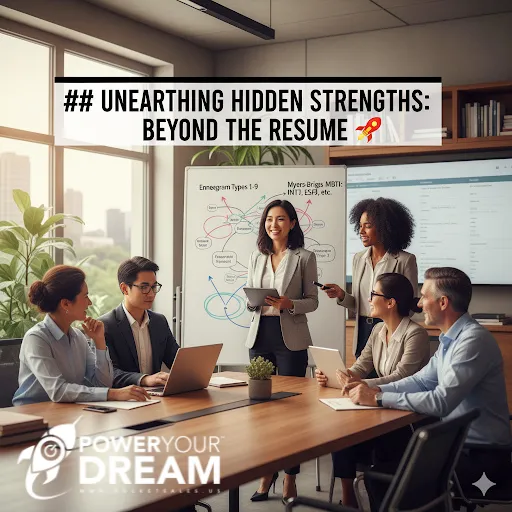
Unearthing Hidden Strengths: Beyond the Resume
As a business owner, you're always looking for an edge, a way to optimize your team's performance and foster a thriving work environment. But what if the greatest untapped resource is already sitting right in front of you – your employees' hidden strengths? Often, we hire for specific skills, overlooking the incredible depth of talent that lies beneath the surface. By understanding individual personalities and working styles, you can unlock a new level of potential and build a more resilient, innovative, and engaged team.
Let's explore how frameworks like the Enneagram and Myers-Briggs Type Indicator (MBTI) can illuminate these often-missed strengths, and how a business coach can help you strategically integrate these insights.
The Enneagram: Unpacking Core Motivations
The Enneagram is a powerful tool for understanding an individual's core motivations, fears, and desires. It describes nine distinct personality types, each with its unique way of perceiving the world and interacting with others.
Example: The Achiever (Type Three) You might have an employee who is naturally driven, goal-oriented, and excellent at presenting ideas. On the surface, you see their strong work ethic. But understanding them as a Type Three on the Enneagram reveals their underlying desire to feel valuable and successful. This insight allows you to not just give them tasks, but to frame those tasks in a way that aligns with their need for recognition and achievement, boosting their motivation and output even further. You might empower them with leadership roles on projects, knowing they'll thrive on the opportunity to showcase their capabilities.
Example: The Helper (Type Two) Another employee might be incredibly supportive, excellent at team collaboration, and always willing to lend a hand. While their helpfulness is evident, recognizing them as a Type Two indicates their core desire to be loved and appreciated. You can leverage this by assigning them roles where they can mentor new team members or build strong client relationships. Importantly, you can also ensure their contributions are explicitly acknowledged, validating their inherent desire to be of service and strengthening their loyalty and engagement.
Myers-Briggs Type Indicator (MBTI): Understanding Preferences
The MBTI provides a different lens, focusing on how individuals prefer to gather information, make decisions, and interact with the world. It categorizes personalities based on four dichotomies: Introversion/Extraversion, Sensing/Intuition, Thinking/Feeling, and Judging/Perceiving.
Example: The Strategist (INTJ) Imagine an employee who is quiet, analytical, and always asking "why." They might not be the most vocal in meetings, but their detailed insights are invaluable. Understanding them as an INTJ (Introversion, Intuition, Thinking, Judging) highlights their preference for deep thought, conceptual thinking, and strategic planning. Instead of expecting them to lead brainstorming sessions (which might drain them), you could assign them complex problem-solving tasks, strategic analysis, or long-term project planning. Their introverted nature means they'll likely produce their best work in a focused, independent environment.
Example: The Facilitator (ESFJ) Conversely, you might have an employee who is energetic, enjoys social interaction, and is great at building rapport. An ESFJ (Extraversion, Sensing, Feeling, Judging) thrives in environments where they can connect with people and foster harmony. You could tap into their strengths by placing them in client-facing roles, team-building initiatives, or roles that require strong interpersonal communication and conflict resolution. They'll naturally excel at creating a positive atmosphere and ensuring everyone feels heard.
The Role of a Business Coach in Formulating a Plan
Understanding these personality frameworks is one thing; effectively integrating them into your business strategy is another. This is where a skilled business coach becomes invaluable.
Assessment and Interpretation: A coach can help you and your team utilize these assessment tools accurately. They can facilitate workshops or individual sessions to help employees understand their own types and how they can best contribute.
Strategic Alignment: With a deep understanding of your team's collective strengths and preferences, a coach can work with you to align roles, responsibilities, and team structures more effectively. They can help identify gaps, leverage diverse thinking styles, and create a more balanced and productive team.
Communication and Conflict Resolution: Coaches can develop strategies for improved internal communication, helping different personality types understand and appreciate each other's perspectives, leading to reduced conflict and increased collaboration.
Growth and Development Plans: Beyond just optimizing current roles, a coach can help design personalized development plans that capitalize on an employee's natural inclinations, guiding them toward roles and responsibilities where they can truly shine and grow.
Implementation and Accountability: Most importantly, a coach provides the framework for action. They help you formulate a concrete plan, set measurable goals, and establish accountability to ensure these insights are translated into tangible improvements within your organization.
By looking beyond traditional skill sets and delving into the rich tapestry of individual personalities, you can unlock a powerhouse of hidden strengths within your team. This proactive approach not only boosts performance but also fosters a deeper sense of understanding, appreciation, and belonging, creating a truly exceptional workplace.
Let's partner together to discover your strengths and those of your team! www.rocketsales.us
